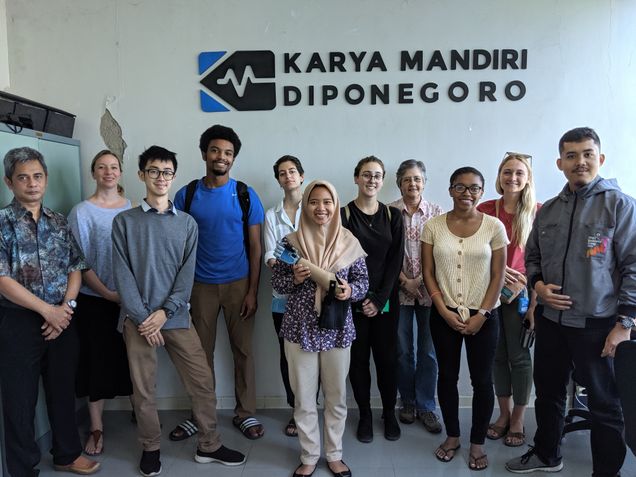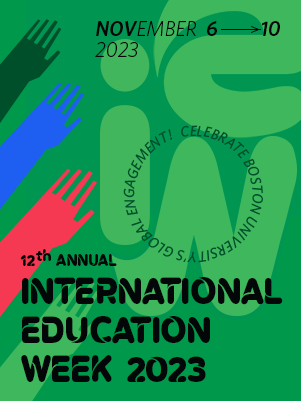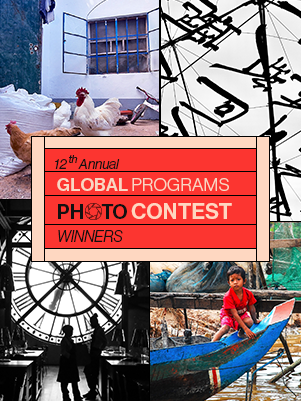BU Geologist Brings Undergrads on Research Trip to Indonesia
Students explore tidal flooding, ground water, coral reef health, among other issues
Dr. Magaly Koch, geologist and associate professor in the Boston University Center for Remote Sensing, recently returned from Indonesia, where she took four Boston University students and two Tufts University students to study environmental change and highly populated coastal areas. Koch conducts research internationally and specializes in the application of remote sensing and geographic information systems in the study of groundwater resources and environmental change of arid lands. Dr. Koch believed that the opportunity to conduct research overseas would be a unique opportunity. According to Dr. Koch, “undergraduate students gained access to global environments where nothing happens in isolation.”
 Koch and the students were able to conduct this work thanks to a National Science Foundation three-year-grant she won that enables international research experiences for U.S. students. Koch is the main PI and works in collaboration with two Co-PIs: BU Professor Sucharita Gopal (Earth & Environment), who is a geographer with expertise in geospatial technology, and Tufts Professor Elena Naumova (Friedman School of Nutrition Science and Policy), who is a biostatistician with expertise in big data analytics.
Koch and the students were able to conduct this work thanks to a National Science Foundation three-year-grant she won that enables international research experiences for U.S. students. Koch is the main PI and works in collaboration with two Co-PIs: BU Professor Sucharita Gopal (Earth & Environment), who is a geographer with expertise in geospatial technology, and Tufts Professor Elena Naumova (Friedman School of Nutrition Science and Policy), who is a biostatistician with expertise in big data analytics.
Koch recognized that the environmental problems affecting Indonesia – tidal flooding, rising sea levels, and sinking of coastal zones in Java island where 140 million people live, to name just a few critical issues – could help “students learn firsthand the complexity of problems that affect highly populated, coastal communities” and that students could contribute to the research being conducted on these serious issues. The BU students who participated are Hayden Dickerson (CAS ’21), Coretta Granberry (CAS ’21), Victoria (Cory) Seremetis (CAS ’20), and Juliette Bateman (CAS ’20). They are studying biology, marine science, environmental science, and earth sciences.
Koch worked with Diponegoro University (UNDIP), a public university in Semarang, Central Java, Indonesia, and the Center for Coastal Rehabilitation and Disaster Mitigation Studies, also in Indonesia, to setup a “headquarters” for the students as well as create teaching and learning opportunities for everyone involved.
“We had a workshop for people from UNDIP and our students,” she said. “We also created mentorship opportunities for students and faculty of UNDIP. Our mentors were incredibly helpful.”
Together with her Co-PIs, Koch served as a mentor for the students and established the structure of the program, ensuring students would receive training to gain basic tools and knowledge before embarking on their research. In addition, students from UNDIP led U.S. students around the island, including going to local markets where U.S. students learned about the costs of items in Indonesia.
“Students really appreciated the field trips we took,” Koch said. “The field trips could be cultural – to connect them to traditions or customs – or related to the work we were doing. They offered us extremely valuable experiences to see firsthand the issues we read about in our literature. We could see where trash was accumulating because of flooding.”
 “The UNDIP students took us to sites we would have never seen otherwise,” said earth and environment student Juliette Bateman, who participated in the six-week trip. “We saw how every aspect of life is so different from the U.S. We also made great friends with the UNDIP students who took us around the city. They helped us see the sites through a local’s perspective; they were so accommodating and amazing. If they come to Boston, I’d love to show them around.”
“The UNDIP students took us to sites we would have never seen otherwise,” said earth and environment student Juliette Bateman, who participated in the six-week trip. “We saw how every aspect of life is so different from the U.S. We also made great friends with the UNDIP students who took us around the city. They helped us see the sites through a local’s perspective; they were so accommodating and amazing. If they come to Boston, I’d love to show them around.”
They also took a mangrove conservation visit and worked with UNDIP students to prepare a coastal flood survey that is used annually to interview locals about the impact of flooding and waste accumulation and map those changes.
Before she embarked on any this work, Koch tapped Global Programs, and specifically the Operations and Health Safety & Security teams in Global Support, to help ensure the success of her international activities and well-being of all research participants.
“We made sure she had all necessary research permits, which are required to conduct research in Indonesia,” said Danielle Bailey, Senior Program Manager of Operations for Global Programs.
Before students and the PIs departed for their trip, Koch brought in Global Program’s Joe Finkhouse, Associate Director of Health, Safety & Security, to lead a pre-departure training. This covered everything from health, safety, and security, to logistics about passports, visas, and registering their travel in the BU International Travel Registry.
Among other things, Koch said, “I learned about what to do in case of an emergency. I also think it was helpful to have experts talk to the students about safety so they just didn’t hear it from faculty.”




